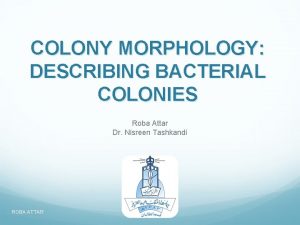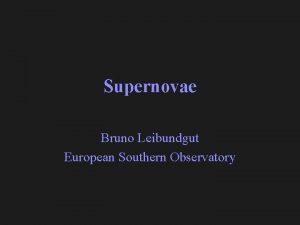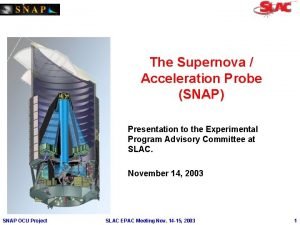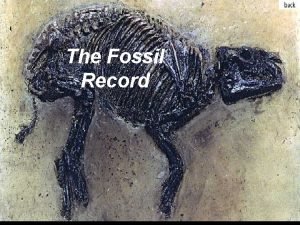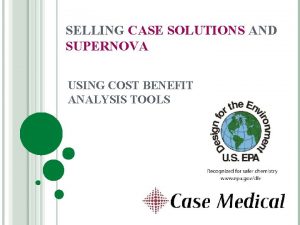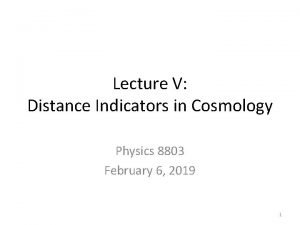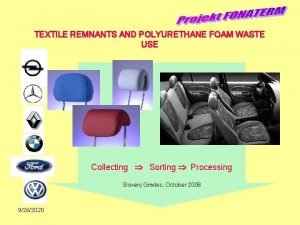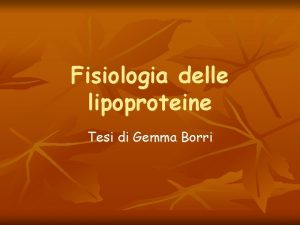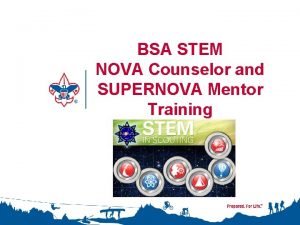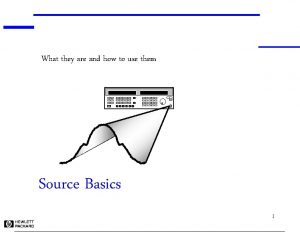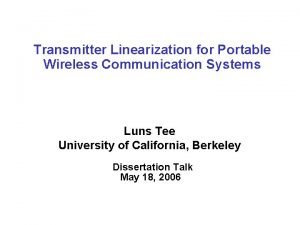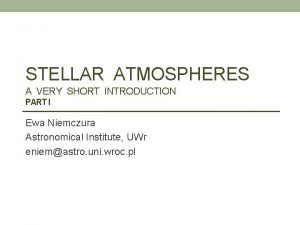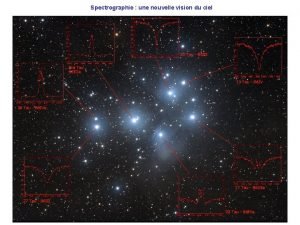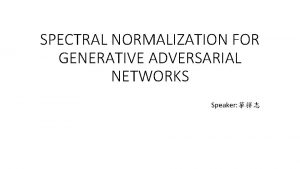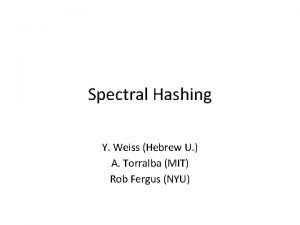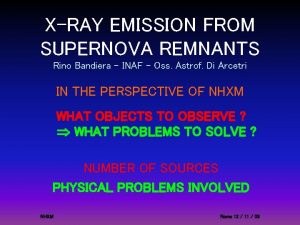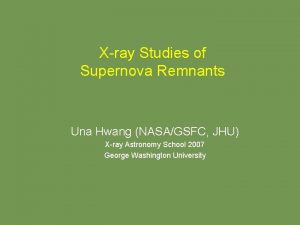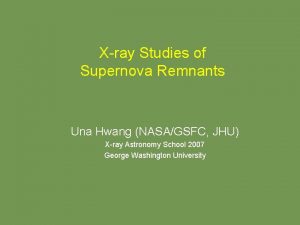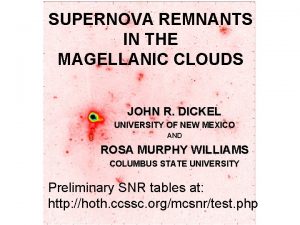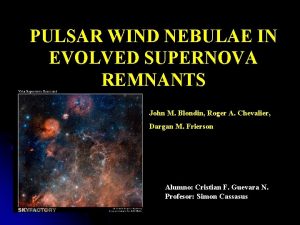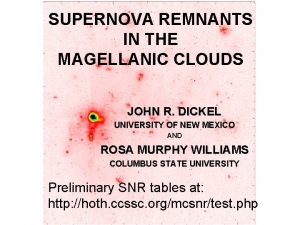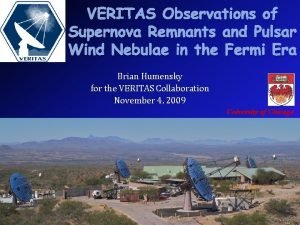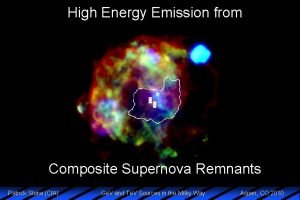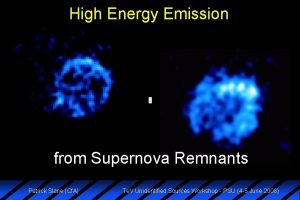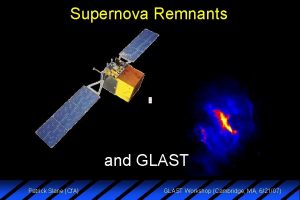XRay Spectral Morphologies of Young Supernova Remnants John

















- Slides: 17

X-Ray Spectral Morphologies of Young Supernova Remnants John P. Hughes Rutgers University § Cara Rakowski, Rutgers § Parviz Ghavamian, Rutgers § Jessica Warren, Rutgers § Pat Slane, Cf. A § Dave Burrows, Penn State § Sangwook Park, Penn State § John Nousek, Penn State § Gordon Garmire, Penn State § Peter Roming, Penn State § Anne Decourchelle, Saclay October 10, 2002 COSPAR Houston, TX 1

Young Supernova Remnants n n n n Nucleosynthesis Explosion Mechanism: neutrino driven convection, jets ? Progenitor mass, influence on environment Compact objects, pulsars and pulsar wind nebula (PWN) Cosmic ray acceleration Dynamical evolution of SNRs Physics of high Mach number shocks October 10, 2002 COSPAR Houston, TX 2

Overturning Our View of Cas A Hughes, Rakowski, Burrows, and Slane 2000, Ap. JL, 528, L 109. October 10, 2002 COSPAR Houston, TX 3

Oxygen-Rich SNR G 292. 0+1. 8 Park et al 2001, Ap. JL, 564, L 39 October 10, 2002 COSPAR Houston, TX 4

Oxygen-Rich SNR G 292. 0+1. 8 Ejecta Rich in O, Ne, and Mg, some Si [O]/[Ne] < 1 No Si-rich or Fe-rich ejecta October 10, 2002 COSPAR Houston, TX 5

Oxygen-Rich SNR G 292. 0+1. 8 Normal Composition, CSM Central bright bar – an axisymmetric stellar wind (Blondin et al, 1996) Thin, circumferential filaments enclose ejecta-dominated material – red/blue supergiant winbd boundary October 10, 2002 COSPAR Houston, TX 6

Oxygen-Rich SNR G 292. 0+1. 8 Point source Featureless power-law spectrum, photon index = 1. 7 Surrounded by diffuse X-ray/radio nebula Off center, implied speed of ~800 km/s October 10, 2002 COSPAR Houston, TX 7

PSR J 1124 -5916 in G 292. 0+1. 8 n n n Discovered at Parkes (Camilo et al 2002) P=0. 1353140749 s, d. P/dt=7. 471 E-13 Characteristic age ~ 2900 yrs (SNR age ~ 1600 yrs) Not detected in coherent FFT of Chandra HRC observation 3. 5 sigma detection from Zn 2 test at radio parameters Only ~130 pulsed events in 50 ks October 10, 2002 COSPAR Houston, TX 8

PSR J 1124 -5916 n n n Image Analysis: point source and elliptical gaussian (small nebula) Point source contains ~160 X-ray events Pulsed fraction high ~80% Unpulsed point source emission < 1. 4 E-3 cts/s LBB< 1033 erg/s Below standard cooling curve for 2000 yr old PSR October 10, 2002 COSPAR Houston, TX 9

DEM L 71: Ejecta and Shock Physics Chandra/NASA Rutgers Fabry-Perot/NOAO Hard H alpha X-ray Soft X-ray Hughes, Ghavamian, Rakowski, and Slane, Ap. JL, in prep October 10, 2002 COSPAR Houston, TX 10

Fe-Rich Ejecta October 10, 2002 COSPAR Houston, TX 11

Properties of DEM L 71 Ejecta n n Outer rim: lowered abundances, ~0. 2 solar (LMC ISM) Core: enhanced Fe abundance, [Fe]/[O] > 5 times solar ( ejecta) Thick elliptical shell, 32” by 40” across (3. 9 pc by 4. 8 pc) Dynamical mass estimate Wang & Chevalier 2001 r’ ~ 3. 0 Mej = 1. 1 Mch (n/0. 5 cm-3) n EM mass estimate EM ~ ne n. Fe V MFe < 2 Msun n Main error: source of electrons Fe-rich, low mass October 10, 2002 SN Ia COSPAR Houston, TX 12

DEM L 71: Shock Physics Nonradiative Balmer-dominated shock Measure post-shock proton temperature October 10, 2002 X-ray emission from thermal bremsstralung Measure post-shock electron temperature COSPAR Houston, TX 13

Nonradiative Balmer Shocks n n n Nonradiative means that a radiative (cooling) zone does not form Low density (partially neutral) gas High velocity shocks Narrow component: cold H I overrun by shock, collisionally excited Broad component: hot postshock protons that charge exchange with cold HI (Chevalier & Raymond 1978; Chevalier, Kirshner, & Raymond 1980) Ghavamian, Rakowski, Hughes, and Williams 2002, Ap. J, in prep. October 10, 2002 Width of broad component yields post shock proton temperature COSPAR Houston, TX 14

Constraining the Electron Temperature Fit NEI shock models to 3 spatial zones to follow evolution of Te n Study 5 azimuthal regions with sufficient Chandra statistics and broad Halpha component n Available data cannot constrain Te gradients n n Data do determine mean Te Suggest partial to compete temperature equilibration n Rakowski, Ghavamian, Hughes, & Williams 2002, Ap. J, in prep. October 10, 2002 COSPAR Houston, TX 15

Results on Te/Tp from DEM L 71 Shows trend for higher equilibration for lower speed shocks n X-ray/Halpha results consistent with other purely Halpha ones n October 10, 2002 COSPAR Houston, TX 16

THE END October 10, 2002 COSPAR Houston, TX 17
 Colony morphologies
Colony morphologies Bruno leibundgut
Bruno leibundgut Romeo and juliet vocabulary act 5
Romeo and juliet vocabulary act 5 Deqms sdmp
Deqms sdmp Supernova acceleration probe
Supernova acceleration probe Evidence of evolution of remnants and impressions *
Evidence of evolution of remnants and impressions * Steris decontamination sinks
Steris decontamination sinks Supernova spectra
Supernova spectra Foam remnants
Foam remnants Supernova
Supernova Entologista
Entologista Supernova mentor
Supernova mentor Spectral regrowth
Spectral regrowth Spectral regrowth
Spectral regrowth Spectral classification
Spectral classification Profil spectral rigel
Profil spectral rigel Spectral normalization for generative adversarial networks
Spectral normalization for generative adversarial networks Spectral hashing
Spectral hashing
